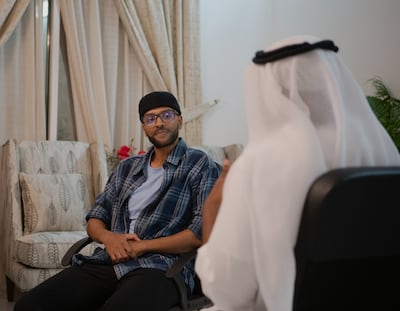Hundreds of Somalis gathered in Dubai this weekend to watch The Gravedigger’s Wife, a powerful film by Khadar Ayderus Ahmed.
The Finnish-Somali writer-director was there to screen his award-winning movie, which had its premiere at Cannes Film Festival last year, at Cinema Akil’s first Arab Cinema Week, which ended on Sunday.
For 10 days, the programme by Cinema Akil showcased films and creators from 11 Arab countries. Ahmed’s film, which was Somalia’s first entry for the Best International Feature Film at the Academy Awards, was among those screened for the first time in the UAE.
It tells the story of Guled (played by Omar Abdi), a gravedigger in Djibouti who is struggling to raise money to pay for surgery for his wife, Nasra (Yasmin Warsame), who has kidney disease.
“When I first heard there was a Somali film submitted for an Oscar, I couldn’t believe it,” said Siham Hussein Dini, who works at First Abu Dhabi Bank and travelled from Sharjah to watch it.
“The point I took from the movie is it represents the actual love that we are all used to. Love isn’t a fairy tale as we see in happy endings. Love can be found at every end of the universe.”
She said the film, in particular the ending, was “very powerful”.
“As soon as I left the cinema, I called my friends and family to show off with pride about our Somali movie.”
This is exactly what Ahmed was trying to achieve. “The movie goes with you, so that is what I love,” he told a gathering by the Somali Professional Network at the Somali Social & Cultural Club in Ajman during his stay in the UAE.
“I have heard so many different perspectives of how people interpreted the ending of the movie. Each person interpreted through their own life experiences and I felt that was powerful.
“I wanted the audience to decide for themselves.”

It was a sudden death in Ahmed’s real life that inspired the fictional story and he built the plot around five gravediggers he saw outside the hospital.
“Everything I have written is inspired by conversations I have had with my family members, colleagues and friends,” Ahmed tells The National.
“In Africa, once you die, you are buried within a couple of hours, as quickly as possible and gravediggers would do the job quickly.”
Once he had his story, he set about finding a cast. He’d worked with Abdi before on a short film, while Warsame, a Somali-Canadian model, had never had an acting role before, but Ahmed knew he’d found his Nasra after seeing a poster of her. “I said this is her.
“Luckily she fell in love with the script and agreed to do it.”
Ahmed then shot the film in Djibouti in 2019, but the release was delayed until last year because of Covid-19 disruptions.
“In Djibouti, we found everything we needed in the script. The landscape, the desert, the beach, everything."
Now, he’s turned his attention to his next project. He’s busy writing his next feature film, which will be in Somali as well, and is working on another horror-thriller in post-production that will be ready soon.
“I want to make all my films in Africa.”
Ahmed was born in Somalia and moved to Finland at the age of 16. He didn’t go to film school but discovered his love for the industry at a very young age. “I thought this is exactly what I want to do and to really tell stories and turn them into visuals.”
His friends and family weren't supportive of his career choice at first. “[My mother] wanted me to be a doctor or lawyer or something safe. And to be the only Somali filmmaker in Finland, she said ‘it is very difficult and you may not make it’.
“But once I invited her to the premiere of my first film and she saw hundreds of people showing up to watch it, that is when she came to terms with it and said ‘I will leave you alone’.”
Since then, his mother has been his biggest fan and now goes with him to festivals.

His mission is to create stories that would make Somalis proud.
“I wanted to leave a legacy to Somali people,” he says. “So I decided I want this film to be in full Somali, shot in Somalia with a Somali cast.
“Every western film that has been about us is related to pirates, warlords and very stereotypical. I said that is not the world I grew up in.
“I am not a pirate, I couldn’t relate to those movies. We are so much more than that.
“We are a nation of storytellers and poets. And I grew up with telling and sharing stories.”

